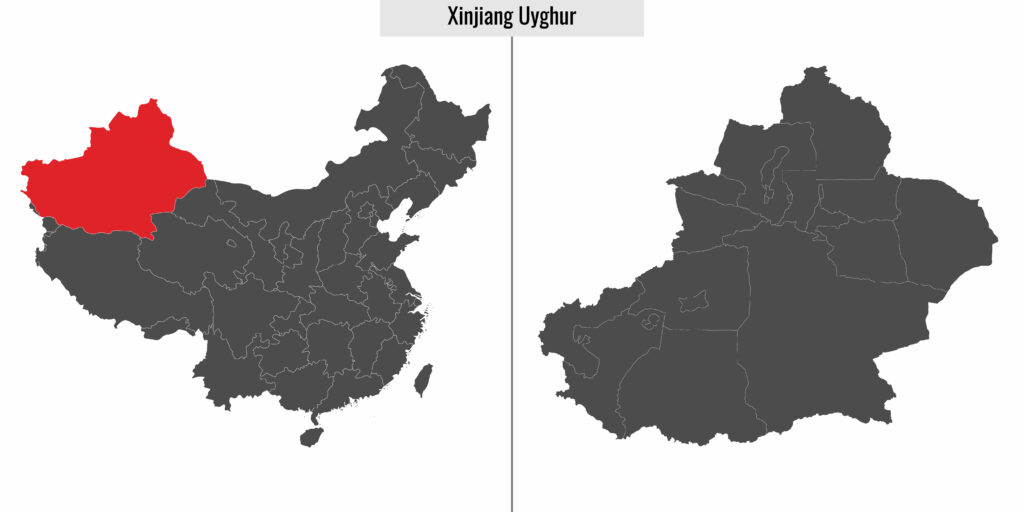
Mexico is only USMCA country not to investigate forced labor; citizen request for action rejected
23 de January de 2024
Translated from Spanish
Five years after signing the USMCA, when the United States, Mexico, and Canada committed to banning the import of products made with forced labor, Mexico is the only one of the three countries that does not publicly recognize Xinjiang, China, as a vulnerable region and has not investigated goods made with forced labor regardless of their origin. In Mexico, the Secretariat of Labor and Social Welfare (STPS) is responsible for complying with this commitment and, since May 2023, an agreement and guide have been in force that establish the guidelines for Mexican individuals or companies to request that their government investigate and ban these imports. In August 2023, Empower filed the first-ever request to the STPS to investigate the supply chains of the firms Dahua and Hikvision after identifying that both supply mass video surveillance cameras to local and state governments in Mexico and that these firms have links to Xinjiang, a province internationally recognized as an epicenter of human rights violations, including forced labor. Despite this scenario, the STPS decided not to act.
By Elizabeth Rosales
The first and only request received by the Mexican Secretariat of Labor and Social Welfare (STPS) to ban the import of goods potentially manufactured with forced labor was dismissed on November 14, 2023, by the agency following an opaque process that was challenged by Empower, the solicitant, with the support of the Economic, Social and Cultural Rights Project (ProDESC) through a nullity action submitted before the Mexican Federal Tribunal of Administrative Justice on January 12, 2024.
On August 30, 2023, this organization sent the STPS a request for review of the import of mass video surveillance cameras with facial recognition software manufactured by the Chinese companies Dahua and Hikvision. These cameras were acquired in 2022 by the municipal government of Ciudad Juárez for public security purposes, and previously by other governments, as explained in the article1“Ciudad Juárez Acquires Surveillance Equipment from Chinese Companies Banned by the U.S.”, Empower Journalism, 7 June 2023, empowerllc.net/en/2023/06/07/surveillance-border-dahua-hikvision. “Ciudad Juárez acquires video surveillance equipment from Chinese companies banned by the U.S.,” the first in a special series on forced labor in which Empower reveals that these devices are manufactured with inputs from Xinjiang and that Hikvision has as shareholders other companies with operations in that province.2“Mexico’s Agreement against Forced Labor: A Half Measure without a Budget, despite USMCA,” Empower Journalism, 9 August 2023, empowerllc.net/en/2023/08/09/forced-labor-usmca.
This region, located in northwest China, has been pointed out by international bodies, civil society organizations, and survivors3“Contemporary forms of slavery affecting persons belonging to ethnic, religious and linguistic minority communities: report of the Special Rapporteur on Contemporary Forms of Slavery, Including Its Causes and Consequences, Tomoya Obokata,” United Nations, August 2022, share.mayfirst.org/s/JLSm8d9pam7bn2D. as a province that raises concerns about systematic human rights violations against ethnic and religious minorities such as the Uyghur, including practices such as forced labor.
Empower further identified for this special series that both Dahua and Hikvision have as shareholders other companies operating in Xinjiang.4“Mexico’s Agreement against forced labor: a half measure without a budget, despite USMCA,” Empower Journalism, 9 August 2023, empowerllc.net/en/2023/08/09/forced-labor-usmca.
This is relevant because, since signing the United States-Mexico-Canada Agreement (USMCA), the three countries have committed to ban imports of products made wholly or partially with forced labor and each has enacted laws and/or published agreements to monitor these types of imports.
However, unlike its trading partners, Mexico does not yet publicly recognize Xinjiang as a vulnerable region.
For Louisa Greve, global director of the Uyghur Human Rights Project, an organization dedicated to defending the human rights of the Uyghur community in China, the evidence of forced labor in Xinjiang is so strong that it is safe for importers to assume that a product with inputs from that region is likely to have used forced labor.
“This is explicit in the U.S. Law, the Uyghur Forced Labor Prevention Act, but Canada and Mexico also banned the import of forced labor and must pay special attention to anything with Xinjiang inputs. So, in fact, investigation is necessary and certainly [when it comes to] high risk products, surveillance equipment is the number one example,” she commented.
Just recently, in February 2023,5“ACUERDO que establece las mercancías cuya importación está sujeta a regulación a cargo de la Secretaría del Trabajo y Previsión Social,” Diario Oficial de la Federación, 17 February 2023, dof.gob.mx/nota_detalle.php?codigo=5679955&fecha=17/02/2023. Mexico published in the Official Journal of the Federation an agreement prohibiting the import of goods produced with forced labor and establishing the STPS as the agency responsible for enforcement. The agreement came into force in May 2023 and, in the context of Empower’s request to the STPS to investigate the risk of forced labor in the supply chains of Dahua and Hikvision, the director of Hemispheric Affairs of the STPS, Mara Angélica Salazar Monreal, said that the Secretariat was already informally investigating the Xinjiang textile industry for the same reasons stated in Empower’s request.
However, the STPS dismissed the Dahua and Hikvision case, arguing that the findings presented by Empower were insufficient to prove the use of forced labor and that the organization failed to provide data that no member of civil society could have accessed since it was classified as confidential information.
The Mexican authorities (municipal and state) that acquired Dahua and Hikvision cameras classified the technical specifications of the goods they acquired, making it impossible to obtain the data through freedom of information requests. Moreover, in Mexico, import data in general is not public by law, since according to the National Customs Agency “the information contained in Mexico’s customs entry forms, through which foreign trade operations of specific taxpayers are carried out, is classified as confidential.”
Nevertheless, these classified documents contain data that the STPS requires in order to approve a review request related to forced labor, for example the detailed description of all components, technical specifications, uses, nature, and inputs used in the manufacture of the merchandise indicated and the exact tariff classification.
For Eduardo Villarreal Cantú, coordinator of Analysis and Advocacy at ProDESC, an organization that defends economic, social, and cultural rights, the mechanism that prohibits the import of products made with forced labor formally complies with the USMCA, but it does not establish obligations for importing companies to make public the information about their imports. Instead, it requires solicitants to provide all of this information.
“This does not facilitate the process; it complicates it. It sets a very high threshold for access to the mechanism and the probabilities of that happening are very low. The authority even requires the specific tariff used, which is technical knowledge that is not available to everyone. Civil society organizations could play an accompanying role here, but it requires more specific corporate research.”
Throughout the process initiated by Empower, the organization identified that the burden of research to identify forced labor in a supply chain falls entirely on the solicitants, as the STPS requires “exhaustive evidence” to consider a case, despite technical difficulties in accessing confidential information in Mexico and the limitations of civil society to conduct fieldwork in exporting countries.
This is in contrast to other mechanisms derived from the USMCA, “such as the Rapid Response Mechanism, which has to do with issues of democratization and the right to free association. The spirit of this mechanism is to ensure that waiting times are shorter and that the evidence on the part of the complainant is the minimum necessary for the State to activate its force and hold the companies to account,” Villarreal added.
In this regard, Empower has found that the STPS faces obstacles such as limitations in terms of human resources, with only five officials in the area responsible for enforcing this agreement, and a budget gap as it does not have a budget item specifically allocated for these tasks, according to data obtained by Empower through the National Transparency Platform.
This has resulted in an opaque and ambiguous process in which, during more than five months of requesting interviews, the STPS refused to speak with Empower about its work and clarify the steps it is taking against forced labor.
An uphill climb
In order to implement the agreement that bans the import of goods made with forced labor, the STPS published, in May 2023, the Guide for the Implementation of the Mechanism to Restrict the Import of Goods Produced with Forced Labor,6“Guía para la instrumentación del mecanismo para restringir la importación de mercancías producidas con trabajo forzoso u obligatorio,” Gobierno de México, May 2023, www.gob.mx/cms/uploads/attachment/file/826091/GUI_A_INSTRUMENTACIO_N_TF_VF_2.1.pdf. which details the STPS’s procedure and the requirements for submitting a request for review.
This guide establishes, for example, that submissions may be filed by any individual or legal entity, “as long as they are legally constituted in Mexico,” thus denying the possibility that affected workers in exporting countries can file applications directly.
The Guide also establishes as official channels for submitting applications a Single Window for Mexican Foreign Trade (VUCEM), which to date has not been enabled for this purpose, and the e-mail address buzontrabajoforzoso@stps.gob.mx.
The requirements for any request for review must include: name, commercial name, or company name and domicile of the solicitant; the customs regime; legal grounds for the request; facts and their description; supporting documents; the tariff classification, technical specifications, function, use, and nature of the goods in question; name, tax identification number, or company name and domicile of the producers; and the importer’s contact information.
Empower sent by e-mail a request that included these points and explained the cases in which the information was classified for public safety reasons.
A month later, the STPS responded with an e-mail in which it requested additional information about each of the points, including instructions that are not detailed in the implementation guide of the agreement nor in the agreement itself, for example to include “all e-mails and the name of the management representative of the three companies indicated,” even though Empower had already provided contact details.
When Empower pointed out that neither the Guide nor the agreement require this level of detail, the STPS responded that “the authority requires the greatest amount of data about the importer,” but that omitting such information would not affect the application process. Empower did include this information and responded to the extent possible based on publicly available information. Empower also provided, for example, information about the general use of the cameras that were acquired by local and state governments for surveillance, but reiterated that data such as the “detailed description of all components, technical specifications, uses, and the nature” of the cameras could not be obtained by this organization or any other due to classification.
Empower also provided the STPS with the tariff classifications most similar to those of the imported goods indicated by Empower, in response to the STPS’s request to “update them based on the latest version of the Tariff of the Law of General Import and Export Taxes (TIGIE), dated August 16, 2023,” despite the fact that the goods indicated in the request were imported before 2022.
Finally, these examples served as the pretext that the STPS used to justify its decision to dismiss Empower’s request exposing the risks of forced labor in the Dahua and Hikvision supply chains, as explained in an e-mail from the STPS dated November 14, 2023.
Consequently, Empower filed an nullity action, with support from ProDESC, before the Federal Tribunal of Administrative Justice on January 12 in order to challenge the resolution of the STPS, arguing illegality by imposing on the solicitant, in this case Empower, requirements and standards that exceed those established in the corresponding regulatory framework, as well as by failing to comply with the duty of due diligence in the prevention and investigation of possible human rights violations, and by undermining the public law nature of the procedure to identify forced labor in the production of imported goods.

Xinjiang, the subject of another investigation in Mexico?
In August 2023, the director of Hemispheric Affairs of the STPS, Mara Salazar, informed Empower by telephone that the agency was investigating the use of forced labor in the textile industry in Xinjiang, but the general director of Institutional Relations, Jorge Arturo Rios Badillo, denied the existence of such an investigation in a freedom of information request.7Freedom of Information request No. 330027123001438, Plataforma Nacional de Transparencia, 3 November 2023, share.mayfirst.org/s/Jnmxj5adP74DMfw.
An official statement on forced labor in Xinjiang and the opening of an investigation would mean public recognition by the Mexican Government of the Chinese Government’s human rights violations against ethnic minorities in this region, as has already been done by the other signatories of the USMCA, the United States and Canada. However, sources interviewed for this article doubt that this will happen.
There are reasons why the current Mexican Government is not more insistent in singling out and monitoring Xinjiang, said an academic source with knowledge of the context in which Mexico has avoided taking a position on Xinjiang and who asked to remain unnamed due to fear of reprisals. In their opinion, one reason is the fact that Mexico has not been able to resolve its own problems of human rights violations against native peoples and that advocating for the Uyghurs could raise questions about what Mexico is doing internally to eradicate violations such as forced labor.
“Of course, there are also economic interests involved and it is simply better to keep quiet so as not to place oneself in an awkward situation,” the specialist added.
Although this is not the only industry vulnerable to forced labor issues, Xinjiang’s textile industry is particularly noted for its use in supply chains.
A report published in 2022 by the U.S. International Trade Commission8“Disentangling the Knot: Identifying U.S. and Global Exposure to Xinjiang Cotton,” U.S. International Trade Commission, October 2022, www.usitc.gov/publications/332/working_papers/disentangling_the_knot_final_102522-compliant.pdf. estimated that cotton from Xinjiang accounts for about 87% of Chinese production and 23% of world supply.
This raw material had previously been listed by U.S. Customs and Border Protection as a product “with reasonable evidence of forced labor,” but, in 2022, the U.S. Government expanded its restrictions through the Uyghur Forced Labor Prevention Act (UFLPA),9“Uyghur Forced Labor Prevention Act,” U.S. Customs and Border Protection, 21 July 2023, www.cbp.gov/trade/forced-labor/UFLPA. which disallows all imports made in whole or in part in Xinjiang unless the importer can prove that no forced labor was used in any part of the production process.
Canada, on the other hand, has also implemented sanctions against China in response to the systematic violation of human rights in Xinjiang, relying on its Special Economic Measures Act.10“Canadian Sanctions Related to People’s Republic of China,” Government of Canada, August 2023, www.international.gc.ca/world-monde/international_relations-relations_internationales/sanctions/china-chine.aspx?lang=eng#a1.
In 2021,11“Canada announces new measures to address human rights abuses in Xinjiang, China,” Government of Canada, 12 January 2021, www.canada.ca/en/global-affairs/news/2021/01/canada-announces-new-measures-to-address-human-rights-abuses-in-xinjiang-china.html. the Canadian Government announced that, in coordination with the United Kingdom and other governments, it was focused on implementing measures against forced labor, for example by requiring Canadian companies doing business directly or indirectly with companies based in Xinjiang to sign a “declaration of integrity” acknowledging Xinjiang’s vulnerable situation and confirming their commitment to carry out due diligence processes to avoid becoming unwitting accomplices of companies that use forced labor.
According to Guillaime Baraubé, spokesperson for the Canada Border Services Agency (CBSA), it is not necessary for a third party to file a complaint documenting human rights violations in a supply chain for the Canadian government to decide to investigate or request information from the companies involved in an import process.
“The Government of Canada expects companies to take every step possible to ensure that their supply chains conform to Canadian law. It is the responsibility of the importer to exercise due diligence to ensure forced labour is not directly or indirectly used in the production of the goods it imports,” Baraubé responded by e-mail.
In this regard, the CBSA examines all goods entering Canada to ensure that they are properly declared and meet import requirements. All goods imported into Canada undergo a risk assessment to identify potentially high-risk shipments, such as those from Xinjiang.
In other words, both the United States and Canada actively investigate the risks of forced labor in supply chains that include labor from that Chinese region. Only Mexico does not, despite the USMCA.
For Eduardo Villarreal, of ProDESC, there are two reasons that could explain why this happens differently in Mexico: the first is the Mexican Government’s inspection capacity and the second is the influence that corporations have to capture this type of mechanism.
“On the one hand, the Mexican Government looks good saying that it is already doing something, but there are regulatory dimensions that have no repercussions and, in that sense, it keeps the companies happy because [these mechanisms] do not represent any danger for them,” he commented.

Resistance to provide information about USMCA agreement
For over three months, Empower unsuccessfully requested information from the STPS on goods and regions vulnerable to or at risk of forced labor, countries with which it has agreements to investigate these cases, and links with other Mexican agencies, such as the National Customs Agency.
Likewise, on numerous occasions, Empower requested an interview with any representative of the STPS who could resolve doubts about the work being done to restrict goods made with forced labor.
In September 2023, an STPS spokesperson turned this request over to the head of the Decent Work Unit, Alejandro Salafranca, although the unit in charge of restricting the import of goods made with forced labor is another (the Labor Policy and Institutional Relations Unit). After pointing this out to the spokesperson, he responded that he had been instructed by a superior to direct the request to Salafranca. Finally, the STPS did not grant an interview, but sent written information on November 23.
In the document shared with Empower, the agency pointed out that “the STPS will not be able to process unsubstantiated requests without exhaustive evidence and supporting documents,” that currently “it has not detected any case of forced or compulsory labor” and that, despite not having a budget allocated for these tasks, “it has the necessary resources to meet this commitment.”
However, this does not answer what happens in cases such as the one submitted by Empower, which involves goods acquired by local and state governments that withheld information about these purchases despite evidence that such goods are manufactured with materials processed in regions vulnerable to forced labor recognized by the United States and Canada, Mexico’s partners in the USMCA.
The agency is also ambiguous as to what circumstances or conditions would lead it to initiate an investigation of its own volition by answering that it could do so if it “has sufficient evidence” and omitting how it would obtain this “evidence” in the first place.
In a direct consultation with the communications area of the STPS, its spokesperson responded that such investigations could be opened “when [there is] a public complaint through the media” if the agency considers it solid.
As of October 2023, the STPS had granted interviews to only 11 media outlets, according to a freedom of information request submitted by Empower.12Freedom of Information request No. 33OO27123OO’1437, Plataforma Nacional de Transparencia, 24 October 2023, https://share.mayfirst.org/s/QfENbrwgiqfni6n.
Months of work without results
More than 10 months since the Mexican Government informed of the new responsibilities of the STPS, and half a year since the agreement that formalizes it came into force, the agency has shown no progress, neither by carrying out any investigations on its own or by relying on requests for review such as the one submitted by Empower. It should be noted that, currently, the STPS does not maintain any collaboration with other countries to investigate supply chains of products at risk of forced labor, according to a freedom of information request that Empower submitted through the National Transparency Platform.
“However, if collaboration with other countries is required, it will be requested on a case-by-case basis,” the STPS said through folio 33OO27123001438.
Although the STPS has been consistent in explaining that it requires “detailed and exhaustive information” to approve a request for an investigation about the import of products made with forced labor, solicitants will face multiple obstacles such as access to information that was classified by governments when it comes to goods acquired by cities, states, or the federation for public safety purposes.
But those interested in activating this mechanism face not only the challenge of obtaining information that is not public by law in this country, such as imports, but also the requirement of being legally constituted in Mexico to file a request for review before the STPS even if the victims of forced labor in these cases are foreigners and, finally, the unwillingness of the STPS to be transparent about its decision making and guidance on ways that do lead to compliance with the agreement prohibiting the importation of products made with forced labor.
Without the will to facilitate these inspection processes from the STPS, the impact of the mechanism that restricts the importation into Mexico of goods made with forced labor looks unfavorable, according to Villarreal.
“I conclude as I started: the agreement makes Mexico look good before its USMCA trade and political partners, but it is more designed to address superficial concerns rather than solve deeper problems. Substantively, it does not appear to be intended to ban the import of these products. What can be done? The Mexican Government should lower the threshold that exists today, which is too high and discourages the filing of complaints. It should also consider how to make these complaints as simple as possible. The government should requires those who are violating a right, the companies, to clarify whether they are in compliance or not. This would flip the equation on its head.”
1 “Ciudad Juárez Acquires Surveillance Equipment from Chinese Companies Banned by the U.S.”, Empower Journalism, 7 June 2023, empowerllc.net/en/2023/06/07/surveillance-border-dahua-hikvision.
2 “Mexico’s Agreement against Forced Labor: A Half Measure without a Budget, despite USMCA,” Empower Journalism, 9 August 2023, empowerllc.net/en/2023/08/09/forced-labor-usmca.
3 “Contemporary forms of slavery affecting persons belonging to ethnic, religious and linguistic minority communities: report of the Special Rapporteur on Contemporary Forms of Slavery, Including Its Causes and Consequences, Tomoya Obokata,” United Nations, August 2022, share.mayfirst.org/s/JLSm8d9pam7bn2D.
4 “Mexico’s Agreement against forced labor: a half measure without a budget, despite USMCA,” Empower Journalism, 9 August 2023, empowerllc.net/en/2023/08/09/forced-labor-usmca.
5 “ACUERDO que establece las mercancías cuya importación está sujeta a regulación a cargo de la Secretaría del Trabajo y Previsión Social,” Diario Oficial de la Federación, 17 February 2023, dof.gob.mx/nota_detalle.php?codigo=5679955&fecha=17/02/2023.
6 “Guía para la instrumentación del mecanismo para restringir la importación de mercancías producidas con trabajo forzoso u obligatorio,” Gobierno de México, May 2023, www.gob.mx/cms/uploads/attachment/file/826091/GUI_A_INSTRUMENTACIO_N_TF_VF_2.1.pdf.
7 Freedom of Information request No. 330027123001438, Plataforma Nacional de Transparencia, 3 November 2023, share.mayfirst.org/s/Jnmxj5adP74DMfw.
8 “Disentangling the Knot: Identifying U.S. and Global Exposure to Xinjiang Cotton,” U.S. International Trade Commission, October 2022, www.usitc.gov/publications/332/working_papers/disentangling_the_knot_final_102522-compliant.pdf.
9 “Uyghur Forced Labor Prevention Act,” U.S. Customs and Border Protection, 21 July 2023, www.cbp.gov/trade/forced-labor/UFLPA.
10 “Canadian Sanctions Related to People’s Republic of China,” Government of Canada, August 2023, www.international.gc.ca/world-monde/international_relations-relations_internationales/sanctions/china-chine.aspx?lang=eng#a1.
11 “Canada announces new measures to address human rights abuses in Xinjiang, China,” Government of Canada, 12 January 2021, www.canada.ca/en/global-affairs/news/2021/01/canada-announces-new-measures-to-address-human-rights-abuses-in-xinjiang-china.html.
12 Freedom of Information request No. 33OO27123OO’1437, Plataforma Nacional de Transparencia, 24 October 2023, https://share.mayfirst.org/s/QfENbrwgiqfni6n.




